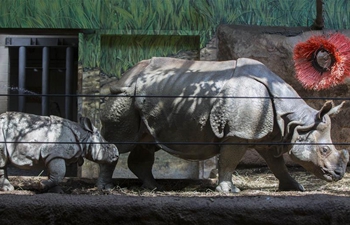WASHINGTON, May 15 (Xinhua) -- A study published on Tuesday in the journal Immunity showed that a high-fiber diet increased survival in influenza-infected mice by setting the immune system at a healthy level of responsiveness.
Researchers from Monash University found that dietary fiber blunted harmful, excessive immune responses in the lungs while boosting antiviral immunity by activating T cells.
These dual benefits were mediated by changes in the composition of gut bacteria, leading to an increase in the production of short-chain fatty acids (SCFAs) through the microbial fermentation of dietary fiber, according to the study.
The paper's senior author Benjamin Marsland and his team at Monash found that mice were protected from influenza infection by a diet supplemented with either the highly fermentable fiber inulin or SCFAs.
These treatments led to both the dampening of the innate immune response that is typically associated with tissue damage, and also the enhancement of the adaptive immune response that is charged with eliminating pathogens.
"We typically find that a certain treatment turns our immune system either on or off," Marsland said. "What surprised us was that dietary fiber was selectively turning off part of our immune system, while turning on another, completely unrelated part of our immune system."
Marsland and his team will further examine how dietary changes influence the immune system, and particularly how changes in the gut can influence lung diseases.
They are planning dietary intervention studies in humans to determine how their results could best be translated to day-to-day living.
"There is a need for carefully designed and controlled dietary or SCFA intervention studies in humans to address how these findings could be exploited to benefit people with asthma, or for preventing viral infections," said Marsland.
"We should also look further into these pathways as a means of supplementing other therapies or enhancing vaccine efficacy," said Marsland.

















